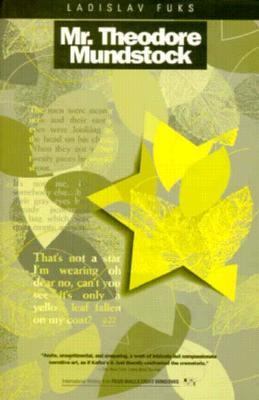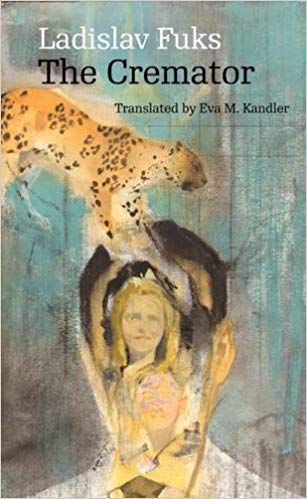Here’s a brilliant author few seem to remember: the Czech Ladislav Fuks (1923-1994), who wrote several novels in his day but is known in the English speaking world for just two books, MR. THEODORE MUNDSTOCK and THE CREMATOR. Both are deliriously odd, darkly comedic looks at the holocaust whose underlying intentions are profoundly serious—so too the acclaimed 1970 film made from the latter novel.
 The Prague-based Fuks came of age during the Nazi occupation of Czechoslovakia, and evidently had a lot to say about it. MR. THEODORE MUNDSTOCK (PAN THEODOR MUNDSTOCK), initially published in 1963, was his first novel, and apparently “made him famous almost overnight.” The American version, translated by Iris Urwin and issued by Orion Press in 1968, introduced English speaking readers to a novel as rich and eccentric as anything by Fuks’ fellow countryman Franz Kafka.
The Prague-based Fuks came of age during the Nazi occupation of Czechoslovakia, and evidently had a lot to say about it. MR. THEODORE MUNDSTOCK (PAN THEODOR MUNDSTOCK), initially published in 1963, was his first novel, and apparently “made him famous almost overnight.” The American version, translated by Iris Urwin and issued by Orion Press in 1968, introduced English speaking readers to a novel as rich and eccentric as anything by Fuks’ fellow countryman Franz Kafka.
It’s the story of Mr. Mundstock, a Jewish man living in Prague circa 1942. All his acquaintances have been shipped off to concentration camps and Mundstock figures his own transport is imminent. He’s understandably panicked about this eventuality, until he hits upon a solution of sorts to his dilemma.
Being an extremely methodical sort, Mundstock decides he’ll prepare for his stay in the concentration camp, which will hopefully make his time there less harsh. He painstakingly works out how to dress (a heavy coat so as not to stand out in any way and incur the wrath of his Nazi captors), what to pack in his suitcase (which he practices carrying so it won’t be too heavy) and how to behave inside the camp (which he prepares for by sleeping on a plank in his cramped apartment).
Inevitably this “preparation” becomes an all-consuming obsession, and before long Mundstock is having people punch him in the face so he’ll know how to react when the Nazis smack him around. Of course by this point the reader may find him/herself wondering if Mr. Mundstock will live long enough to see the fruits of his preparations!
The result is a deeply compassionate yet profoundly disturbing novel. The tone is overtly satiric, yet the overall impression is one of all-encompassing psychological horror. I found parts of it irritatingly jumbled and incoherent (possibly the fault of a shoddy translation), but they didn’t detract from the book’s unwavering focus and intensity.
Fuks followed up this triumph with THE CREMATOR (SPAOLVAC MRTVOL) in 1967. It had to wait until 1984 to see publication in the US and  Britain, courtesy of Marion Boyars, who commissioned a translation by Eva M. Kandler.
Britain, courtesy of Marion Boyars, who commissioned a translation by Eva M. Kandler.
THE CREMATOR isn’t as well known as the former novel, and nor did it attain the same fanfare. It’s a far more troubling work overall, seeing as how it explores the Holocaust from the opposite vantage. As in MUNDSTOCK the viewpoint is that of a single individual living in Nazi-occupied Prague: Mr. Kopfkringl, a cremator.
An almost impossibly cheerful, sunny man, Kopfkringl loves his job (which he sees as returning people’s bodies to where they originated) and cares deeply for everybody around him, including Willi, a Nazi pal. Unfortunately Kopfkringl begins listening to Willi’s doggerel a bit too closely.
Once sympathetic to Jews, Kopfkringl finds his attitude to them changing as poisonous Nazi ideals increasingly contaminate his thinking. This is especially problematic considering that his wife Lakme has Jewish blood in her veins, as do their children, which inspires the increasingly unhinged Kopfkringl to take some drastic actions (hint: they involve his occupation).
Kopfkringl’s descent into psychosis is conveyed subtly, via a fat man and his babbling wife who seem to appear at whatever event Kopfkringl attends and enact that same arguments each time, as well as the protagonists’ constant reading about the Dali Lama (which pays off in the grim finale). As in MUNDSTOCK, the tone is one of grim satire overlaying a barely-concealed mood of utter terror, rendered all the more chilling because it’s staunchly reality-based. The novel is a gut-wrencher, even if the writing and/or translation, with its minute descriptions and deceptively uneventful narrative, take some getting used to.
Speaking of which, a Czech film version of THE CREMATOR appeared in 1970, co-scripted by Fuks and directed by the talented Juraj Herz. MUNDSTOCK seems a far more film-friendly work to me, but of the two books it was the bleak and eccentric CREMATOR that made it to the screen. An avant-garde effort lensed in black and white, the film follows the events of the novel fairly closely, down to the (deliberately) meandering non-story and meticulous detail-oriented set pieces.
Herz favors handheld camerawork and ultra-wide angle lenses, which lend a real sense of tension and unease to even the most mundane sequences. The set-ups are wildly baroque and expressionistic, especially toward the end, when the protagonist appears framed before a reproduction of Bosch’s “The Garden of Earthly Delights.”
In such a visually concentrated work it’s inevitable that the performances take a back seat—you won’t see too many write-ups of this film praising its actors, and there’s a reason for that. Rudolf Hrusinsky as Kopfkringl goes clear over the top, and Herz does little to rein him in. The character functions in the novel and film as an exaggerated caricature, but I’d say Hrusinsky overdoes it. His Kopfkringl is such a weirdo it hardly seems a stretch when he goes mad. with the most surprising thing being that anyone ever trusts him in the first place.
But as a purely visual exercise THE CREMATOR is quite an experience. The overall effect is one of macabre fascination and profound disquiet, which also sums up both novels outlined above. They’re all we English speakers have of Fuks’ ouvre, but in their cumulative power these two books and single film cast a formidable shadow.
